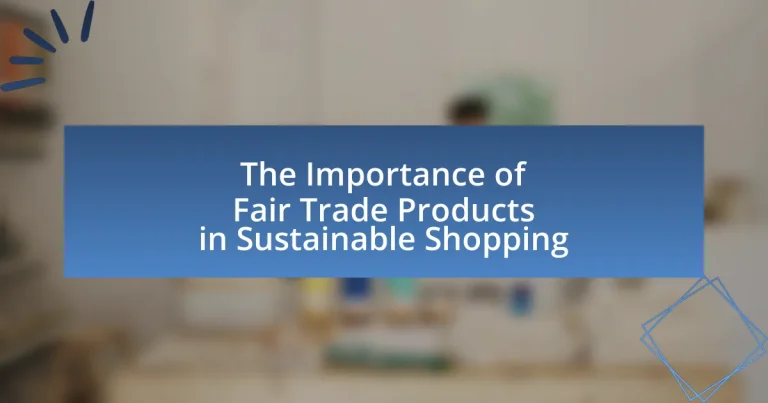Fair Trade products are goods produced and traded under standards that ensure fair wages, ethical labor practices, and sustainable farming methods. These products play a crucial role in sustainable shopping by promoting social equity and environmental sustainability, addressing poverty and exploitation in developing countries. The article outlines the differences between Fair Trade and conventional products, the criteria for Fair Trade certification, and the certification process. It also discusses the positive impacts of Fair Trade on communities, local economies, and the environment, while highlighting the importance of consumer choices in supporting ethical sourcing. Additionally, the article addresses challenges faced by Fair Trade products in the market and offers strategies for consumers to advocate for and incorporate Fair Trade into their shopping habits.

What are Fair Trade Products and Why are They Important in Sustainable Shopping?
Fair Trade products are goods that are produced and traded under specific standards aimed at ensuring fair wages, ethical labor practices, and sustainable farming methods. These products are important in sustainable shopping because they promote social equity and environmental sustainability, addressing issues such as poverty and exploitation in developing countries. For instance, Fair Trade certification requires that producers receive a minimum price for their goods, which helps to stabilize their income and improve their living conditions. Additionally, Fair Trade practices often include environmentally friendly farming techniques, which contribute to the preservation of ecosystems. According to the Fair Trade International 2021 report, over 1.7 million farmers and workers benefited from Fair Trade practices, highlighting its significant impact on communities and the environment.
How do Fair Trade Products differ from conventional products?
Fair Trade products differ from conventional products primarily in their ethical sourcing and pricing practices. Fair Trade products ensure that producers receive fair wages, work in safe conditions, and engage in environmentally sustainable practices, while conventional products often prioritize cost reduction, leading to exploitation and poor working conditions for producers. For example, Fair Trade certification requires adherence to specific labor standards and environmental guidelines, which are not typically mandated in conventional supply chains. This commitment to ethical practices is supported by organizations like Fair Trade International, which monitors compliance and promotes transparency in the supply chain.
What criteria must products meet to be considered Fair Trade?
Products must meet specific criteria to be considered Fair Trade, including adherence to fair labor practices, environmental sustainability, and equitable trading conditions. Fair Trade certification requires that producers receive fair wages, work in safe conditions, and have the right to organize. Additionally, products must be sourced from farms or cooperatives that practice sustainable agriculture, minimizing environmental impact and promoting biodiversity. Fair Trade standards also mandate that a portion of profits is reinvested into community development projects, ensuring that local communities benefit from trade. These criteria are established by organizations such as Fair Trade International and the World Fair Organization, which monitor compliance to ensure that products genuinely reflect Fair Trade principles.
How does the Fair Trade certification process work?
The Fair Trade certification process involves a series of steps to ensure that products meet specific social, economic, and environmental standards. Initially, producers must apply for certification through a recognized Fair Trade organization, such as Fair Trade International or the Fair Trade USA. These organizations assess the producers’ compliance with Fair Trade standards, which include fair wages, safe working conditions, and sustainable farming practices.
Once the application is submitted, an independent auditor conducts an on-site evaluation to verify adherence to these standards. If the producers meet the requirements, they receive certification, allowing them to label their products as Fair Trade. This certification process not only promotes ethical practices but also supports community development through fair pricing and direct trade relationships. According to Fair Trade International, certified producers receive a minimum price for their goods, which helps protect them from market fluctuations and ensures a stable income.
What impact do Fair Trade Products have on communities?
Fair Trade products positively impact communities by promoting economic stability and social equity. These products ensure that producers receive fair wages, which leads to improved living conditions and access to essential services such as education and healthcare. For instance, a study by the Fair Trade Foundation found that Fair Trade farmers earn up to 30% more than their conventional counterparts, enabling them to invest in their communities. Additionally, Fair Trade initiatives often support community development projects, such as building schools and healthcare facilities, further enhancing the quality of life for community members.
How do Fair Trade Products support local economies?
Fair Trade products support local economies by ensuring that producers receive fair wages and sustainable prices for their goods. This economic model empowers local farmers and artisans, allowing them to invest in their communities, improve their living conditions, and promote local development. For instance, Fair Trade practices often include a minimum price guarantee, which protects producers from volatile market fluctuations, enabling them to plan for the future and invest in education, healthcare, and infrastructure. According to the Fair Trade International 2021 report, Fair Trade certified producers received over $1.6 billion in Fair Trade premiums, which are reinvested into community projects, further enhancing local economic stability and growth.
What social benefits arise from Fair Trade practices?
Fair Trade practices provide significant social benefits, including improved livelihoods for producers and enhanced community development. By ensuring fair wages and safe working conditions, Fair Trade empowers marginalized communities, allowing them to invest in education, healthcare, and local infrastructure. For instance, a study by the Fair Trade Foundation found that Fair Trade farmers earn up to 30% more than conventional farmers, which directly contributes to poverty alleviation and social equity. Additionally, Fair Trade initiatives often support women’s empowerment, as many programs prioritize female participation, leading to greater gender equality in communities.
Why should consumers choose Fair Trade Products?
Consumers should choose Fair Trade products because they ensure ethical sourcing and fair compensation for producers. Fair Trade certification guarantees that farmers and workers receive a minimum price for their goods, which helps to alleviate poverty and promote sustainable livelihoods. For instance, according to the Fair Trade Foundation, farmers in developing countries earn up to 50% more than they would under conventional trade practices. Additionally, Fair Trade practices often include environmental standards that promote sustainable farming methods, reducing the ecological impact of agriculture. This combination of fair wages and sustainable practices makes Fair Trade products a responsible choice for consumers who prioritize ethical consumption.
What are the environmental benefits of Fair Trade Products?
Fair Trade products provide significant environmental benefits by promoting sustainable farming practices that reduce chemical usage and enhance biodiversity. These products often adhere to strict environmental standards, which include organic farming methods that minimize pesticide and fertilizer use, thereby protecting soil and water quality. For instance, Fair Trade certification requires farmers to implement practices that conserve natural resources and promote ecological balance, such as crop rotation and agroforestry. Additionally, Fair Trade initiatives often support reforestation efforts and the preservation of local ecosystems, contributing to a healthier environment. Research indicates that Fair Trade practices can lead to a 30% reduction in chemical inputs compared to conventional farming, demonstrating their positive impact on environmental sustainability.
How do Fair Trade Products promote ethical consumerism?
Fair Trade products promote ethical consumerism by ensuring that producers receive fair wages and work under safe conditions, which directly supports sustainable livelihoods. These products are certified to meet specific social, economic, and environmental standards, which encourages consumers to make informed choices that align with their values. For instance, Fair Trade certification requires that farmers receive a minimum price for their goods, which protects them from volatile market fluctuations and fosters community development. According to the Fair Trade International 2021 report, over 1.7 million farmers and workers benefit from Fair Trade practices, highlighting the significant impact on poverty alleviation and social equity. This model empowers consumers to contribute to positive change through their purchasing decisions, reinforcing the principles of ethical consumerism.

How do Fair Trade Products contribute to Sustainable Shopping Practices?
Fair Trade products contribute to sustainable shopping practices by ensuring ethical sourcing and promoting environmental sustainability. These products are produced under standards that prioritize fair wages, safe working conditions, and community development for farmers and workers, which directly supports social equity. Additionally, Fair Trade certification often requires environmentally friendly farming practices, reducing the use of harmful chemicals and promoting biodiversity. For instance, a study by the Fair Trade Foundation found that Fair Trade farmers are 30% more likely to use sustainable agricultural practices compared to conventional farmers. This combination of social and environmental responsibility makes Fair Trade products a key component of sustainable shopping.
What role do Fair Trade Products play in reducing environmental impact?
Fair Trade Products play a significant role in reducing environmental impact by promoting sustainable farming practices. These products are sourced from producers who adhere to environmentally friendly methods, such as organic farming, which minimizes the use of harmful pesticides and fertilizers. According to the Fair Trade Foundation, certified Fair Trade farmers are encouraged to implement practices that protect biodiversity and conserve water, leading to healthier ecosystems. Additionally, Fair Trade standards often require producers to engage in sustainable land management, which helps combat soil degradation and deforestation. This commitment to environmental stewardship not only benefits the planet but also supports the livelihoods of farmers by ensuring they can maintain their land for future generations.
How do Fair Trade farming practices differ from conventional methods?
Fair Trade farming practices prioritize social equity, environmental sustainability, and economic fairness, contrasting sharply with conventional methods that often emphasize profit maximization and may exploit labor and resources. Fair Trade standards require farmers to receive a minimum price for their products, ensuring a living wage, while conventional farming may subject farmers to volatile market prices that can lead to poverty. Additionally, Fair Trade practices promote environmentally friendly techniques, such as organic farming and biodiversity conservation, whereas conventional methods may rely heavily on chemical inputs and monoculture, which can degrade ecosystems. These differences are supported by the Fair Trade International standards, which outline specific criteria for labor rights, environmental stewardship, and community development, highlighting the commitment to ethical practices in Fair Trade farming.
What are the long-term sustainability goals of Fair Trade?
The long-term sustainability goals of Fair Trade include promoting equitable trading conditions, enhancing environmental sustainability, and empowering marginalized producers. Fair Trade aims to ensure that producers receive fair compensation, which supports their communities and fosters economic stability. Additionally, it emphasizes sustainable agricultural practices that protect the environment, such as reducing chemical use and promoting biodiversity. Fair Trade also focuses on social development, including access to education and healthcare for producers and their families, thereby improving their overall quality of life. These goals are supported by Fair Trade certification standards, which require adherence to specific social, economic, and environmental criteria.
How can consumers identify and support Fair Trade Products?
Consumers can identify and support Fair Trade products by looking for certified labels such as the Fair Trade Certified seal or the World Fair Organization label on packaging. These certifications ensure that products meet specific social, economic, and environmental standards that promote fair wages and sustainable practices for producers. According to the Fair Trade Federation, products with these labels guarantee that farmers receive a fair price, which supports their communities and encourages sustainable farming practices. By choosing products with these certifications, consumers actively contribute to ethical sourcing and support the livelihoods of marginalized producers globally.
What labels and certifications should consumers look for?
Consumers should look for Fair Trade Certified, Rainforest Alliance Certified, and USDA Organic labels when purchasing products. Fair Trade Certified ensures that producers receive fair wages and work under safe conditions, promoting sustainable practices. Rainforest Alliance Certified indicates that products are sourced from farms that meet rigorous environmental and social standards, contributing to biodiversity conservation. USDA Organic certification guarantees that products are grown without synthetic pesticides or fertilizers, supporting ecological balance. These certifications collectively promote ethical sourcing and sustainable shopping practices.
How can consumers find Fair Trade Products in their local area?
Consumers can find Fair Trade products in their local area by utilizing resources such as the Fair Trade Federation’s online directory, which lists certified retailers and products. Additionally, local health food stores, specialty shops, and farmers’ markets often carry Fair Trade items. Research indicates that as of 2021, over 1.7 million farmers and workers in developing countries benefit from Fair Trade practices, making these products increasingly available in various retail environments.

What challenges do Fair Trade Products face in the market?
Fair Trade products face several significant challenges in the market, primarily including consumer awareness, price competition, and supply chain complexities. Consumer awareness remains low, as many shoppers are unfamiliar with Fair Trade principles and the benefits associated with them, which limits demand. Price competition is another challenge, as Fair Trade products often carry a premium price due to ethical sourcing practices, making them less attractive compared to conventional products. Additionally, supply chain complexities arise from the need to maintain Fair Trade certification, which can complicate logistics and increase operational costs. These factors collectively hinder the growth and market penetration of Fair Trade products.
What are the common misconceptions about Fair Trade Products?
Common misconceptions about Fair Trade products include the belief that they are always more expensive, that they guarantee high quality, and that they only benefit producers in developing countries. While Fair Trade products can sometimes have a higher price due to ethical sourcing practices, many consumers overlook that the price reflects fair wages and sustainable practices rather than inflated costs. Additionally, Fair Trade certification does not inherently ensure superior quality; it focuses on ethical production standards. Lastly, while Fair Trade aims to support producers in developing nations, it also encompasses fair practices for workers in developed countries, thus benefiting a broader range of producers.
How do these misconceptions affect consumer choices?
Misconceptions about fair trade products significantly influence consumer choices by leading to skepticism regarding their quality and pricing. For instance, consumers may believe that fair trade items are overpriced without understanding that the premium often reflects ethical sourcing and better wages for producers. Research from the Fair Trade Foundation indicates that 70% of consumers are willing to pay more for products that ensure fair wages and sustainable practices, yet misconceptions can deter them from making these purchases. Consequently, these misunderstandings can result in lower sales for fair trade products, undermining their intended impact on global trade equity and sustainability.
What strategies can be employed to overcome these challenges?
To overcome challenges in promoting fair trade products in sustainable shopping, strategies such as increasing consumer awareness, enhancing supply chain transparency, and fostering partnerships with local producers can be employed. Increasing consumer awareness through educational campaigns can inform shoppers about the benefits of fair trade, leading to more informed purchasing decisions. Enhancing supply chain transparency allows consumers to trace the origins of products, ensuring ethical practices are followed, which builds trust. Fostering partnerships with local producers not only supports community development but also strengthens the fair trade movement by ensuring that producers receive fair compensation. These strategies are supported by research indicating that informed consumers are more likely to choose fair trade products, thus driving demand and supporting sustainable practices.
How can consumers effectively advocate for Fair Trade Products?
Consumers can effectively advocate for Fair Trade products by educating themselves and others about the benefits of Fair Trade, supporting businesses that prioritize Fair Trade sourcing, and utilizing social media to raise awareness. Education enables consumers to understand the positive impacts of Fair Trade on communities and the environment, which can be shared through discussions, workshops, or community events. Supporting businesses that offer Fair Trade products reinforces market demand; for instance, the Fair Trade Certified label indicates adherence to ethical sourcing standards. Social media platforms can amplify advocacy efforts, allowing consumers to share information, promote Fair Trade brands, and engage in campaigns that highlight the importance of ethical consumption. According to the Fair Trade Federation, consumer demand for Fair Trade products has increased significantly, demonstrating that informed advocacy can lead to greater market presence and support for Fair Trade practices.
What actions can individuals take to promote Fair Trade awareness?
Individuals can promote Fair Trade awareness by educating themselves and others about Fair Trade principles and practices. This can be achieved through sharing information on social media platforms, organizing community events, or participating in local Fair Trade campaigns. For instance, according to the Fair Trade Federation, raising awareness can lead to increased consumer demand for Fair Trade products, which supports ethical sourcing and fair wages for producers. Additionally, individuals can support Fair Trade businesses by purchasing certified products, thereby reinforcing the market for Fair Trade goods and encouraging more companies to adopt ethical practices.
How can social media be utilized to support Fair Trade initiatives?
Social media can be utilized to support Fair Trade initiatives by raising awareness, engaging consumers, and promoting Fair Trade products. Platforms like Facebook, Instagram, and Twitter allow organizations to share stories about Fair Trade producers, highlight the benefits of ethical purchasing, and connect directly with consumers. For instance, campaigns that showcase the impact of Fair Trade on communities can increase consumer interest and drive sales. According to a 2020 study by the Fair Trade Foundation, social media campaigns led to a 30% increase in consumer engagement with Fair Trade brands, demonstrating the effectiveness of these platforms in promoting ethical shopping practices.
What are practical tips for incorporating Fair Trade Products into daily shopping?
To incorporate Fair Trade products into daily shopping, consumers should prioritize purchasing items labeled as Fair Trade when available. This can be achieved by seeking out local stores that specialize in Fair Trade goods or by using online platforms that offer a wide range of Fair Trade products. Research indicates that Fair Trade certification ensures that producers receive fair wages and work under safe conditions, which supports sustainable practices. Additionally, consumers can educate themselves about Fair Trade brands and their impact, making informed choices that align with ethical shopping values. By consistently choosing Fair Trade options, shoppers contribute to a more equitable global economy.


